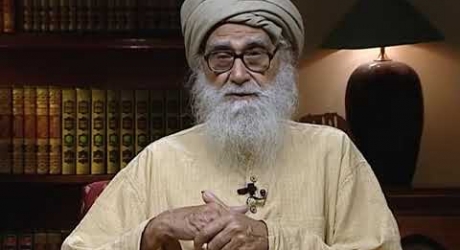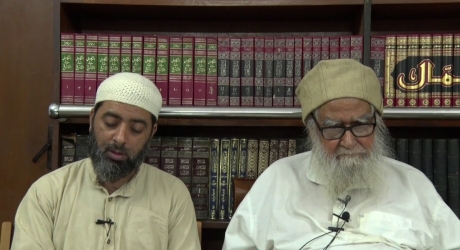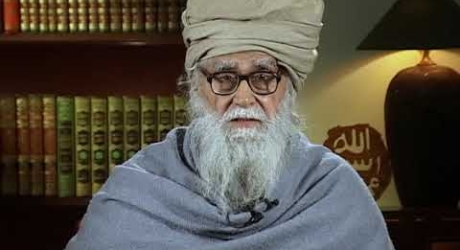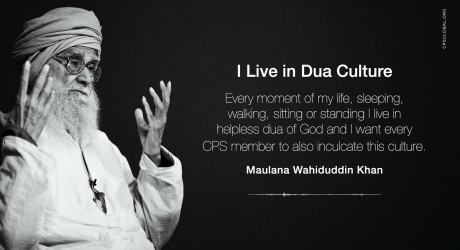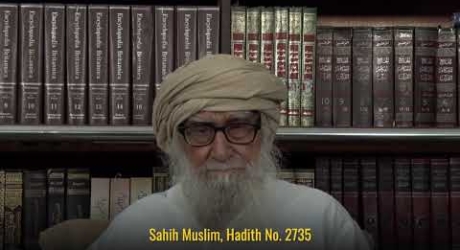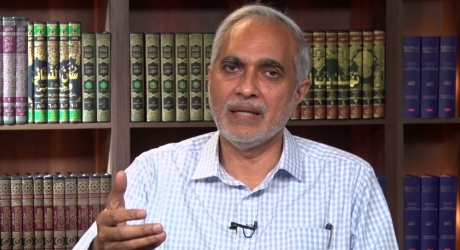Prayer (dua) is a natural utterance for one who has a spiritual bent of mind. However, without realisation, prayer is only a repetition of words. The prayer that comes from a realised soul is prayer in the real sense. The prayer, devoid of maarifah (realisation), is nothing but lip service; it has no value. Prayer is a form of worship, and the real form of worship is one in which the realisation of God is an integral part. Prayer is of two kinds. One is that which requests God to fulfil some need of the suppliant concerning some personal problem he is facing and entreating God to provide a solution. Another form of prayer is that the person praying projects his problem as the problem of God Himself. The first kind of prayer is the result of human needs. However, the second kind of prayer comes from a person’s heart with deep God-realisation. The second kind of prayer is the result of the discovery of God at the level of realisation. This kind of prayer comes out of the heart or mind of a person only when he has some exceptional experience of God’s nearness.
Introduction
Islam gives a lot of importance to dua. According to a Hadith,
Dua is the essence (crux) of ibadat (worship). (Al-Tirmizi)
It is very important to understand that dua is not merely the repetition of some memorised words, which would subsequently have a mysterious effect. In fact, holding such an opinion about dua is tantamount to underestimating it. Dua is an expression of a long intellectual process and not simply an occasional utterance. It is only when a person lives his dua that he is able to do a true dua. It is for such a dua that a Hadith says:
Nothing can alter qazaa (destiny) except dua. (Al-Tirmizi)
God is close to man
According to the Quran, God says to man,
I am near. I respond to the call of one who calls, whenever he calls Me. (2:186)
It is pertinent to question at this stage that why does God say that He is near? So far as I have understood, it is to explain that true dua can only be done by one who experiences nearness to God. Let us now reflect more deeply on the meaning of the phrase ‘nearness to God’. It is not what is thought to be in the traditional sense. Nearness to God is an experience that one has upon discovering God as the Sustainer of the universe. By reflecting over His signs, one starts experiencing the presence of God. It is such times that bring out a living dua.
Often people visit graves to pray for fulfilment of their wishes. They think the elderly (dead) can pray to God on their behalf but this is a serious misconception. Such people have themselves not experienced nearness to God and expect others to do dua for them; such a dua is invalid.
This is because God says that He is near. Therefore the starting point of dua is to feel the presence of God. When a person experiences nearness to God himself, this feeling leads him to recognise God being the Creator and he being a creation. It is after this realisation of God being the Giver and we being the takers that a true dua emerges.
Purpose of Dua
Dua is not merely to seek the fulfilment of one’s material needs or desires. True dua is to express our acknowledgement to God. It is to establish our position of being a creation vis-à-vis our all-Powerful Creator. According to a verse in the Quran, God says,
I created the jinn and mankind only so that they might worship Me. (51:56)
‘Worship’ in the above verse means ‘marefat’ or God-realisation. God has created man so that he attains marefat and understands the purpose of creation. The dua which arises due to experience of marefat or realisation of God is the true dua. In other words, true dua is not the outcome of one’s needs; it is the outcome of a long intellectual process.
Greatest Dua
Greatest dua is neither done by uttering certain memorised words, nor by way of seeking some elderly person to do it on one’s behalf. Greatest dua is one which is uttered in one’s mother tongue. This is because an emotional tempest can be best expressed in the mother tongue and not in a foreign language. This is because mother tongue is that language in which one thinks and when this constant reflection gushing forth as stream of emotions takes to words, it becomes a dua.
Oftentimes it is held that if one memorises and repeats the dua done by the Prophet Muhammad, it would become the greatest dua. This is sheer fallacy because the Prophet himself prayed in his mother tongue. The mother tongue of Prophet Muhammad was Arabic, so he prayed in it. The same applied to all other Prophets. This can be understood by the following verse of the Quran:
Every messenger We have sent has spoken in the language of his own people. (14:4)
According to a verse in the Quran, Prophet Abraham said:
He, who cures me when I am ill. (26:80)
Prophet Abraham did not say this in Arabic. He said it in his mother tongue, but because the Quran was revealed in Arabic therefore the dua of earlier Prophets has been told in Arabic. People believe that Arabic establishes a direct connection with God. They memorise prayers in Arabic thinking that the purpose is served. But this is total fallacy, an act that can never let out a heart-wrenching dua.
Reference Point of Dua
Dua cannot be done in an abstract way, it requires a reference point. Devoid of reference point, dua cannot become an opportunity to establish nearness to God. Let me take a few examples to explain my point.
Prophet Moses is said to have travelled to Midyan from Misr (Egypt) before receiving Prophethood. While traversing the forests on his journey, he halted to rest under a tree. As he sat under the shade of that tree, the following dua came out from his lips:
Lord, I am truly in need of whatever blessing You may send down for me. (Quran, 28:24)
Prophet Moses could do such a dua because that tree became a reference point for it. Sitting under its shade made Moses ponder upon the great blessings of God. Just as the tree, which was nothing but wood and was yet thriving and giving shade, Moses sought God’s blessings on himself.
In other words, points of reference are scattered everywhere in the universe; it is only by way of active thinking that we can apply them in case of a dua.
The example of Asea shall clarify this point further. Asea was Pharaoh’s wife who accepted the faith brought by Moses. When Pharaoh got to know of this, he threatened her and gave the option of either staying in his palace by renouncing the faith of Moses or being subjected to a painful death. The palace of Pharaoh in which she had been living ever since became a point of reference for her. She chose to die with her faith than to stay at his palace.
It was then that she prayed to God,
My Lord, build me a house in nearness to You in paradise. (Quran, 66:11)
Asea could do such a dua as the palace that she had been living in till date belonged to the Pharaoh and she now sought to live in God’s neighbourhood. Such a ‘living dua’ emanated only because of her choosing a reference point.
In my days of being a seeker of truth, I once undertook a journey to Southern India. The train passed through a forest which abounded in Dhak (palas) trees. What struck me as peculiar about this tree was that it was just a trunk bearing beautiful flowers; with no leaves on it. Upon seeing these trees, I prayed to God saying, “O God, if you can cause such beautiful flowers to grow on dry wood, I pray then that you bloom me too with your blessings!”
Similarly death is also a point of reference. People die everyday and many go for observing the last rites. However no one makes death as a point of reference. Nobody thinks that he shall too die in the same way and that his countdown is on. In fact, death is the biggest event which should be made as a point of reference. It is so compelling to think about how a person who walked and talked amongst us – wealthy, poor, influential or accomplished - dies. Death indiscriminately strikes everyone, yet we derive no lesson from it.
Living Dua
It is extremely important to bear in mind that God will not accept anything short of a living dua from us. God created us as creatures with a thinking mind then it is impossible for Him to accept a mechanical dua which has come out without due thinking.
Quran lays a lot of emphasis on thinking. It abounds in words that talk about contemplation, such as tafakkur, tadabbur and stresses that man should undertake an on-going process of thinking. This is because our mind has an unlimited capacity that can be unlocked only by way of continuous thinking. Thinking process is nothing but allowing the mind to unfold its otherwise dormant potential. That is why no less than 500 verses in the Quran make a direct or indirect reference to thinking.
According to a Hadith,
God modelled man on Himself. (Al-Bukhari)
This verse does not refer to man’s physical appearance. It means that God gave man the mind, that no universe, sea or tree can boast of possessing. Such a mind is uniquely possessed by man alone. According to another verse in the Quran,
…and when I have formed him fully and breathed My spirit into him (38:72)
In the above verse “spirit” refers to the mind or man’s thinking prowess. It is the unfolding of this unlimited potential that allows man to let out a living dua.
I am reminded here of an instance of a man from Rampur. His son had been insisting him for a bicycle since long. The father had already told his son that he won’t be able to afford a bicycle. When the child persisted, the father angrily refused. Then the child cried saying, “You are my father, if I won’t ask you, who will I go to?” This touched the father immensely. It was because the words of the son brought on stake the very fatherhood of that man. The impact was such that the father bought his son a bicycle. This instance became a point of reference for me and I prayed, “O God! I am like that boy. You are my Lord and Sustainer. If I don’t seek from you, who can I go to?”
I once met a villager from Azamgarh (U.P.), who had become a member of the Rajya Sabha because of Sanjay Gandhi. His house had all modern-day comforts, and each time he spoke, he invariably expressed his gratitude by saying, “All this is due to Sanjay Babu.” This experience left me thinking that no one ever says, “All this is God’s gift.” Despite that fact that the galaxy, solar system, fruits, streams are all given by God; no one cares to show any acknowledgment of it. I have never seen emotions arising among people for thanking God for the blessings that He has showered upon man. How strange is it that while man is able to see the minute beneficence of a Sanjay Gandhi, he blatantly overlooks the Supreme beneficence of God despite availing of it every moment.
Developing the true spirit of dua
It is crucial to understand that one has to consciously strive to develop the true spirit of dua. To begin with, we must inculcate modesty within ourselves for it is the pre-requisite of a true dua. Praying without modesty is of no use. It is a very valuable trait but most people lack it. According to a hadith, Prophet Muhammad said,
You will do dua but it will not be accepted.
This hadith has come true in today’s times. Dua-s are being done everywhere but to no effect. We therefore need to activate our thinking so that we are able to experience the nearness to God and establish our modesty and position of helplessness before His all-powerful existence. It is only an awakened mind that would be able to let out a living dua, one that will be heard and would get us a place in the neighbourhood of God.
May God guide us!





